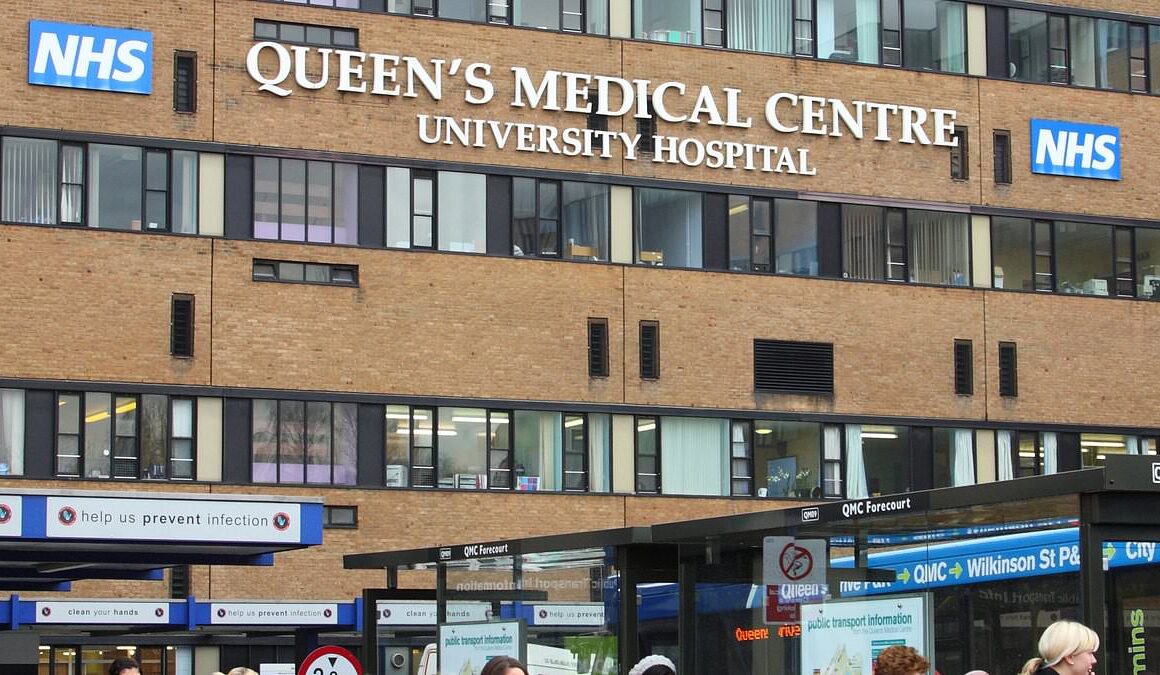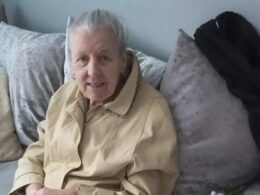An inquest has heard NHS staff ‘missed opportunities’ to diagnose a brain bleed in a 39-year-old mother who had a seizure after hours of waiting in a crowded A&E waiting-room.
Concluding the inquest on Thursday, Nottinghamshire coroner Elizabeth Didcock ruled Inga Rublite died of natural causes having had a condition that had ‘likely been present for years’.
The mother-of-two suffered a ‘massive bleed’ on her brain from an aneurysm while she waited over eight hours to be seen by a doctor at Queen’s Medical Centre (QMC) in Nottingham on January 20, causing ‘significant, irreversible’ brain damage.
Ms Rublite, originally from Latvia, died two days later when brain stem tests showed ‘no improvement in brain function’.
The two-day inquest heard that A&E staff believed Ms Rublite had left QMC after calling for her three times in the waiting room at 4.30am, 5.26am and 6.50am, and once on her phone, so they discharged her from their system.

Coroner Elizabeth Didcock has ruled NHS staff missed opportunities to diagnose 39-year-old mother of two Inga Rublite (pictured) with a brain bleed before she died in an ‘over-crowded’ A&E in January

Ms Rublite suffered a ‘massive bleed’ on her brain from an aneurysm while she waited over eight hours to be seen by a doctor at Queen’s Medical Centre (QMC) in Nottingham causing ‘significant, irreversible’ brain damage
However, staff found the 39-year-old 10 minutes later ‘slumped on the floor’ with a coat over her face ‘seemingly asleep’, but she was found to be having a seizure.
Her twin sister, Inese Briede, who still lives in their home country of Latvia, said there was no missed call on her phone.
Ms Rublite had called 111 on January 19 with a sudden headache, neck pain, and blurry vision feeling ‘as though hit by a brick’.
She then spoke to a clinician on the phone and was advised to go to hospital, where she arrived at about 10.30pm that night.
Evidence presented in the inquest showed staffing levels were ‘depleted’ during the shift and the dedicated senior decision-maker had been diverted to ‘help with pressures elsewhere’.
Ms Didcock said in her final statements that the triage nurse should have spoken to a senior decision-maker, who could have ‘escalated’ the situation based on her symptoms.
She said: ‘I find on balance had she been seen by a senior decision-maker, she would have had a CT scan which would have found the bleeding.’
Ms Didcock concluded that ‘all was done to try to stabilise her’ once Ms Rublite’s condition had been found.
The ward also had ‘significant’ overcrowding because its maximum capacity of 38 people was exceeded by more than double, the inquest heard.
Ms Didcock said the investigation conducted by the NUH had been ‘thorough and thoughtful’, and that ‘many of the issues that this case has identified’ were out of their control.

Ms Rublite (seen with twin sister Inese Briede, right) had called 111 on January 19 with a sudden headache, neck pain, and blurry vision. She then spoke to a clinician on the phone and was advised to go to hospital, where she arrived at about 10.30pm that night. A&E staff believed she had left after calling for her three times in the waiting room and once on her phone, so they discharged her from their system
Dr Manjeet Shehmar, medical director at the Nottingham University Hospitals Trust (NUHT), said they were ‘truly sorry’ they did not meet the standards they ‘strive to deliver’.
He said: ‘We would like to offer our sincere condolences to the family of Inga for their loss.
‘Although due to the nature of the bleed on the brain the outcome is unlikely to have been different, we accept there were missed opportunities in Inga’s care and are truly sorry that we did not meet the standards we strive to deliver.
‘We have completed an investigation in order to assess and implement learning, and as a result have introduced changes in our emergency department to ensure we can deliver better care to patients and support our staff to do this in the future.
‘We fully accept the coroner’s findings and are determined to take all action possible to improve our care.’
According to Luke Derby, an emergency department matron, Ms Rublite had been sat in the main waiting area where it was ‘reasonable’ that staff would have walked past, but she would ‘not be physically seen’ by the person calling for her.
Mr Derby said: ‘We have moved the chairs where Inga was sat because they have poor visibility from the navigator’s desk. They have been moved so people can’t sit there.’
He also confirmed that it was ‘not unusual’ to see patients with coats over their heads, especially during night shifts.







